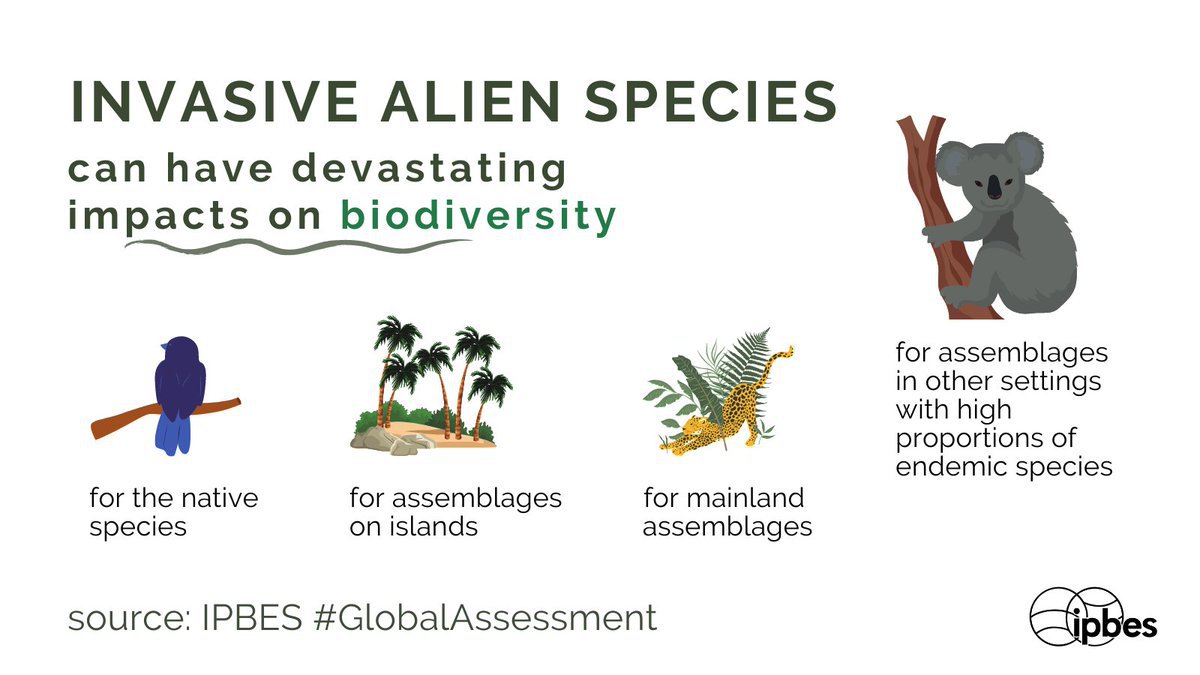Ahmedabad
(Head Office)Address : 506, 3rd EYE THREE (III), Opp. Induben Khakhrawala, Girish Cold Drink Cross Road, CG Road, Navrangpura, Ahmedabad, 380009.
Mobile : 8469231587 / 9586028957
Telephone : 079-40098991
E-mail: dics.upsc@gmail.com

Invasive Alien Species
News: The latest Intergovernmental Platform on Biodiversity and Ecosystem Services (IPBES) report, “Assessment Report on Invasive Alien Species and their Control’’ has said that 37,000 alien species have been introduced by humans, including 3,500 invasive species which are linked to 60% of extinctions of global plant and animals.
What are invasive alien species?
• Invasive alien species (IAS) are animals, plants, or other organisms that are introduced by humans, either intentionally or accidentally, into places outside of their natural range.
• They negatively impact native biodiversity, ecosystem services, or human economy and well-being. They are one of the biggest drivers of biodiversity loss and species extinctions.
What are some examples of invasive species?
• Water hyacinth in Lake Victoria has harmed fish populations and livelihoods.
• Invasive Alien Species spread diseases like malaria, Zika, and West Nile Fever through invasive mosquito species.
• IAS found in India are Water Hyacinth, Lantana, Papaya Mealy Bug (Native to Mexico, America but has severely affected papaya crops in Assam, WB and TN), African Apple Snail.
Key Findings:
• There are 37,000 alien species introduced to various regions and biomes worldwide due to human activities. Among these, over 3,500 are invasive alien species, responsible for 60% of global plant and animal extinctions.
• Invasive alien species are one of the five major drivers of global biodiversity loss, Other drivers are Land and sea use changes, Direct exploitation of organisms and Climate change.
• The number of alien species introduced by humans has been increasing, driven by factors like increased travel, trade, and global economic expansion.
• The annual cost of invasive alien species now exceeds $423 billion annually. The costs of invasive species have quadrupled every decade since 1970. The true cost is more likely in the trillions, with human health issues taking up a large part of that price.
What are the impact of IAS on different sectors?
Invasive species can have a significant impact on the economy, agriculture, biodiversity, tourism, and food supply.
• According to a study, India has lost $127.3 billion (Rs. 8.3 trillion) in the last 60 years to invasive alien species, making the South Asian nation the second most invasion-cost bearing country after the United States.
• Invasive species can cause damage to agriculture, fisheries, forestry, and other industries. They can also increase the cost of maintenance and management of infrastructure such as waterways, power plants, and electrical lines.
• In addition to these direct costs, invasive species can also have indirect economic impacts by reducing biodiversity and ecosystem services, which can affect industries such as tourism and recreation.
• Displacement of native species (European Green crab displacing native crabs in North America), competition with native species and alteration of ecosystem and habitats.
• Impact on Human Health - Spread of diseases such as Aedes mosquitoes spread diseases like malaria and Zika.
• Invasive species pose a huge global threat, both in terms of biodiversity and the cost to economic activities such as agriculture, tourism and development. They disproportionately affect communities in poor rural areas; people who depend on natural resources and healthy ecosystems to make a living.
Key Recommendations:
• Regulating the trade and movement of invasive alien species is the most effective way to prevent their introduction and spread.
• Early detection, monitoring, and rapid eradication can limit the negative impacts of invasive species once they arrive in a new area.
• Legislation to prohibit imports of exotic species.
• Eradication of invasive species that have successfully spread.
• Site-based or ecosystem-based management, enforce border biosecurity and import controls.
• Pest control where eradication is not possible.

Address : 506, 3rd EYE THREE (III), Opp. Induben Khakhrawala, Girish Cold Drink Cross Road, CG Road, Navrangpura, Ahmedabad, 380009.
Mobile : 8469231587 / 9586028957
Telephone : 079-40098991
E-mail: dics.upsc@gmail.com
Address: A-306, The Landmark, Urjanagar-1, Opp. Spicy Street, Kudasan – Por Road, Kudasan, Gandhinagar – 382421
Mobile : 9723832444 / 9723932444
E-mail: dics.gnagar@gmail.com
Address: 2nd Floor, 9 Shivali Society, L&T Circle, opp. Ratri Bazar, Karelibaugh, Vadodara, 390018
Mobile : 9725692037 / 9725692054
E-mail: dics.vadodara@gmail.com
Address: 403, Raj Victoria, Opp. Pal Walkway, Near Galaxy Circle, Pal, Surat-394510
Mobile : 8401031583 / 8401031587
E-mail: dics.surat@gmail.com
Address: 303,305 K 158 Complex Above Magson, Sindhubhavan Road Ahmedabad-380059
Mobile : 9974751177 / 8469231587
E-mail: dicssbr@gmail.com
Address: 57/17, 2nd Floor, Old Rajinder Nagar Market, Bada Bazaar Marg, Delhi-60
Mobile : 9104830862 / 9104830865
E-mail: dics.newdelhi@gmail.com